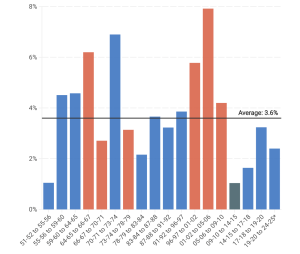Lord Darzi has delivered a stark report on the NHS’s unprecedented problems. The Prime Minister responded with a commitment to producing a new long-term plan for the NHS, but also stated firmly that “no new funding would be available without reform”. With debts mounting this leaves many local NHS leaders with tough choices affecting staff and patients.
Funding shortfall?
In May the IFS calculated that should the new Labour government adhere to the Tories spending plans, the NHS in England would suffer a 1.2% cut, amounting to around £2bn – despite the need to cut waiting times and meet the significant costs of recent pay deals.
In the last budget, the government came up with an additional £2bn, but this leaves the NHS with a real-terms rise of less than 0.5%. Historically the NHS has received around 3.5% extra a year – but not in recent years.

Average annual real growth rate – IFS
Adding to the pressure, NHS England has heavily incentivized each health area to come up with a financial plan that sets a surplus. It will also apply financial penalties on those who produce plans that settle on a deficit.
This carrot and stick approach was in response to the first drafts of these financial plans which collectively predicted a deficit of £3bn. This indicates the size of the problems and casts doubt on whether any reduction in deficits can realistically happen – in this most high-pressure time, without savings and cuts to services.
The drive for cost reduction has already shone through in the first part of a countrywide investigation by Lowdown researchers. In the Southwest NHS recruitment freezes, cuts to short-term staff, and reductions in spending on continuing care have all been decided.
One of the clear consequences of the funding crisis is that the government’s own targets to reduce the waiting lists are unlikely to be met. Backroom discussions are reportedly already underway to slacken off the targets.
The NHS Confederation which represents NHS leaders commented:
NHS leaders need to see a chunk of any new funding provided immediately so that health systems can prepare for what will be another very difficult winter. This should include investment to boost staff and capacity in social care to support urgent and emergency care services.
In a new survey, nearly nine in 10 local health system leaders (87 per cent) told the NHS Confederation they will not be able to meet their ambitions within their current budgets. Thirty-one out of England’s 42 integrated health systems have a deficit plan for the year.
Dear Reader,
If you like our content please support our campaigning journalism to protect health care for all.
Our goal is to inform people, hold our politicians to account and help to build change through evidence based ideas.
Everyone should have access to comprehensive healthcare, but our NHS needs support. You can help us to continue to counter bad policy, battle neglect of the NHS and correct dangerous mis-infomation.
Supporters of the NHS are crucial in sustaining our health service and with your help we will be able to engage more people in securing its future.
Please donate to help support our campaigning NHS research and journalism.


